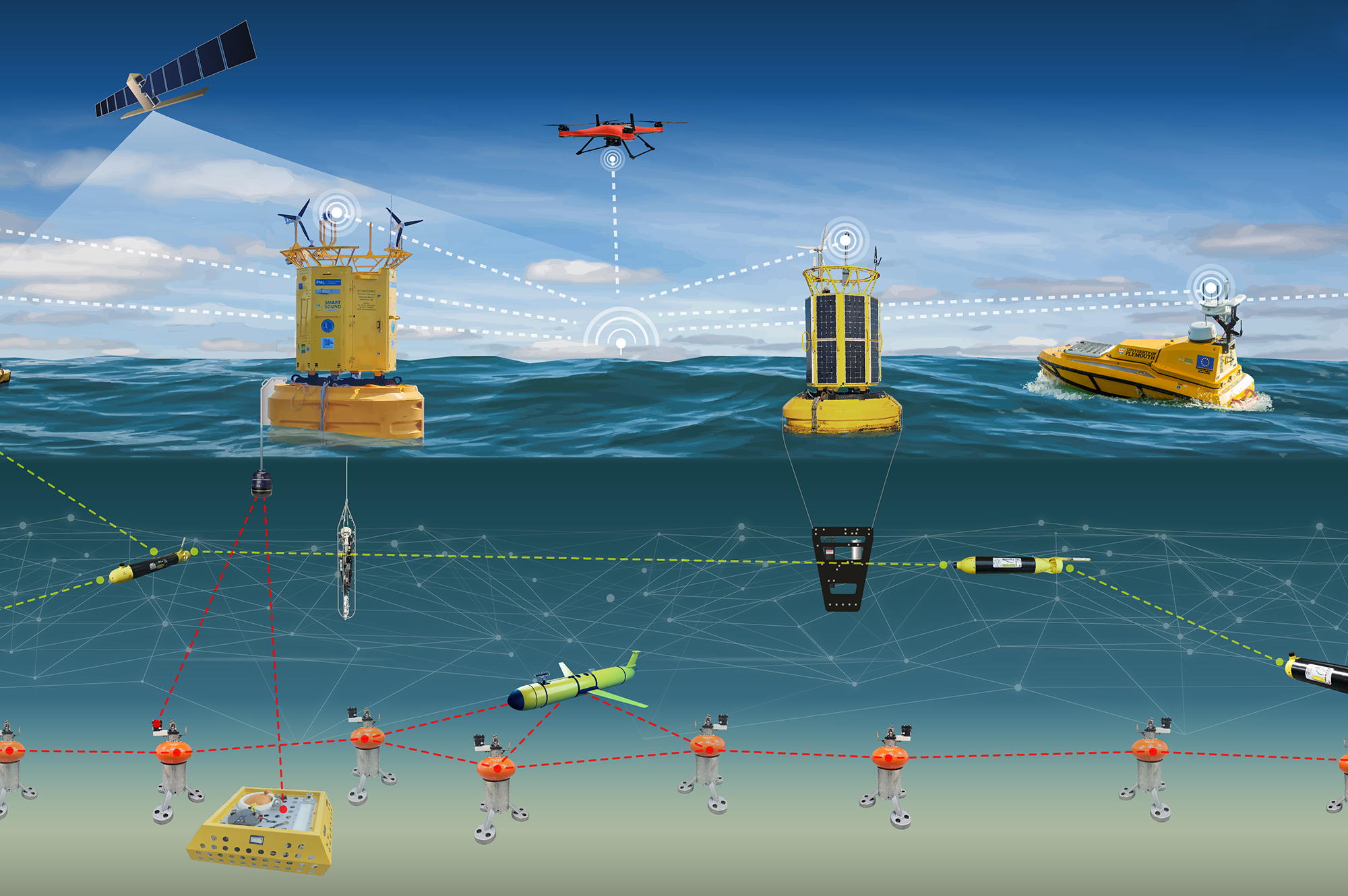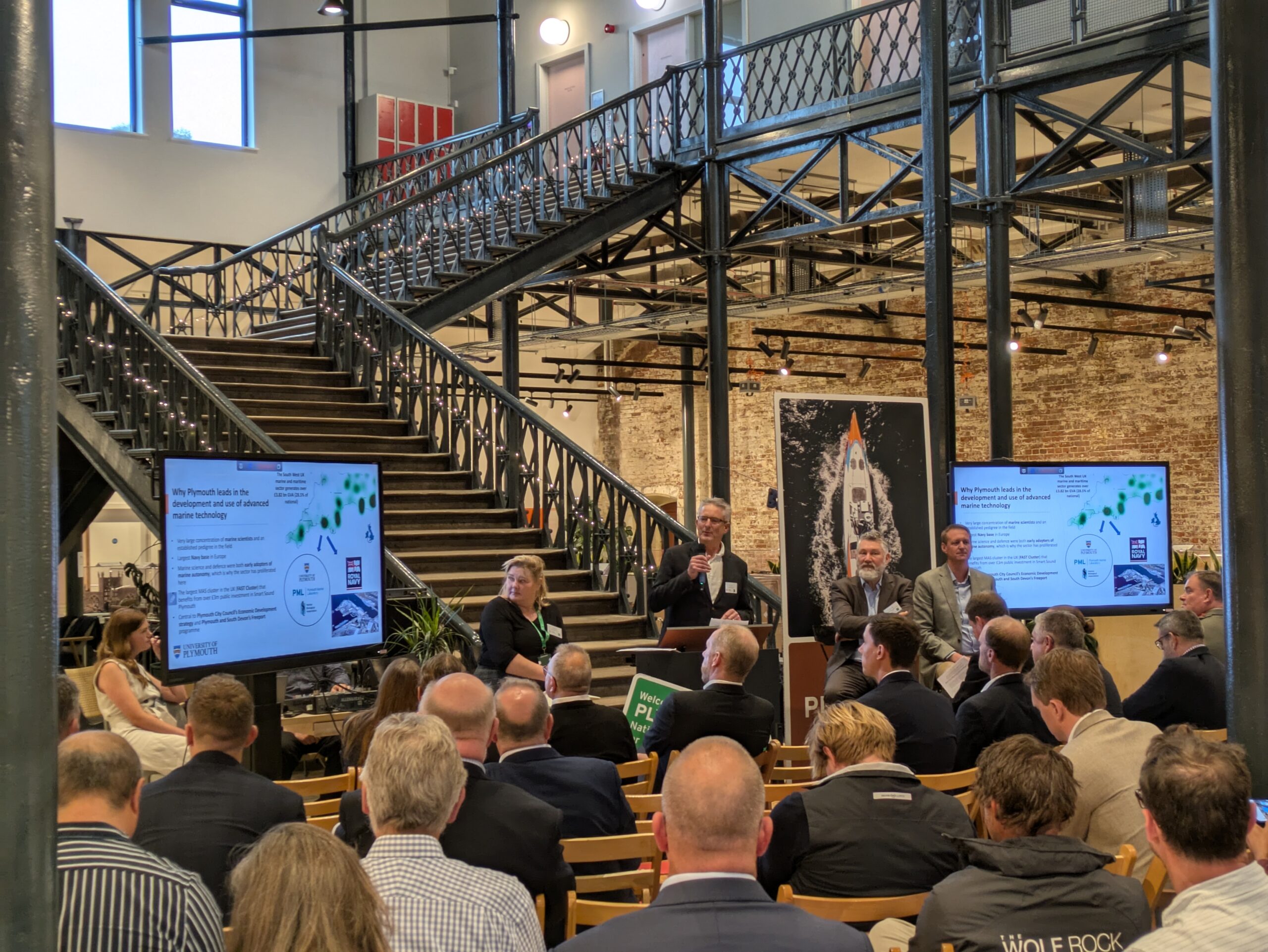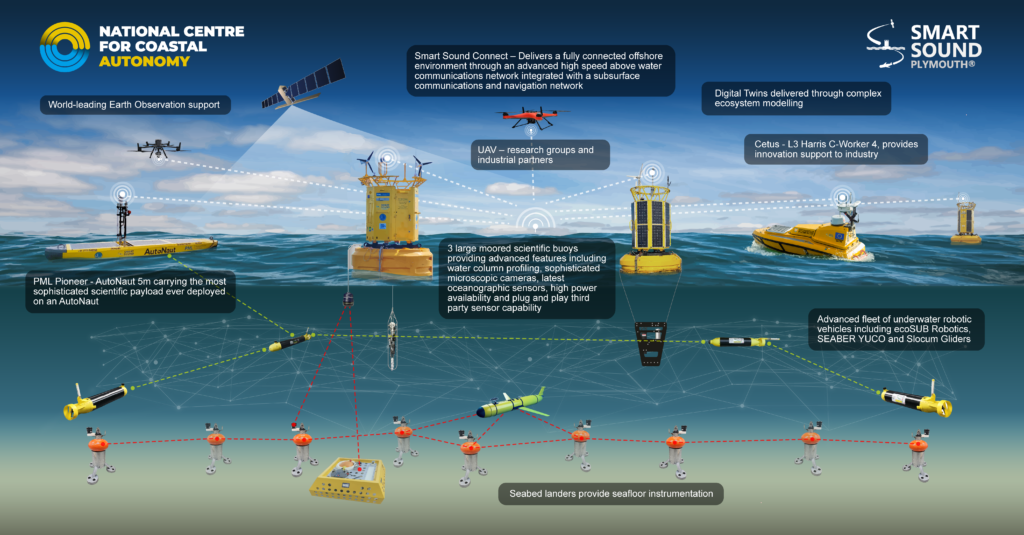Story
Plymouth is to be the national centre for marine autonomy
16 June 2025
Leveraging its unique strengths in marine autonomy, the city is already home to leading initiatives such as the PML co-led National Centre for Coastal Autonomy (NCCA) and PML co-ordinated Smart Sound Plymouth.

The announcement that Plymouth is to be the national centre for marine autonomy, made by the Right Honourable Maria Eagle, Minister of State (Defence Procurement and Industry), will catapult the city and its expertise into the spotlight.
The news came as Plymouth City Council, in partnership with the South West Regional Defence and Security Cluster, hosted an event in Devonport involving key figures from the world of marine, including representatives from PML, and defence.

Over 170 people attended the event on Friday 13 June and it connected key stakeholders to help explore opportunities for future projects and investment.
There were also a themed discussion on advanced marine technology and how Plymouth will drive innovation in dual-use technology for UK Security by representatives from PML and the University of Plymouth.
The news was also included in the recently published UK Government’s Modern Industrial Strategy 2025.
Council Leader Tudor Evans OBE said: “This is superb news. We knew Plymouth was creating something special in the blue/green skills sector, but it is always great to see others endorse what you believe.
“We have some extraordinary businesses and organisations here in Plymouth who are at the cutting edge of this incredibly exciting sector. The world is waking up to all the possibilities marine autonomy offers and we are very keen indeed to help connect Plymouth businesses to the right people and the right organisations.
“Investing in Plymouth’s businesses for testing and developing marine autonomy will enable UK PLC to build sovereign capabilities and secure a significant share in this growing market, particularly in the fields of defence, renewables, and oil and gas.”
MP for Plymouth Sutton and Devonport Luke Pollard told the delegates that the nature of defence is changing. He said: “We have a strategic defence review that sets out that we will have fighting structure which includes marine autonomy.
“Defence is an engine for growth. This an opportunity to develop, scale up and test marine autonomy. This sector is incredible, innovative and the work we are doing in the city is cutting edge.
“There is a place for investment and that’s Plymouth.”
Prof. James Fishwick, Head of Marine Technology and Autonomy at Plymouth Marine Laboratory, Head of Smart Sound Plymouth and Chair of the Future Autonomous at Sea Technologies (FAST) Cluster, who presented on Smart Sound Plymouth at the event, commented:
“Plymouth has been leading the way in marine autonomy across multiple sectors for many years, so this official recognition as the UK’s National Centre for Marine Autonomy is fantastic news. Marine autonomy is firmly rooted here, supported by world-class research, key industry players, and the recent integration of the Royal Navy’s autonomy capabilities.
At Plymouth Marine Laboratory, we were proud to launch with our partners the National Centre for Coastal Autonomy (NCCA) in 2023, establishing Plymouth as a national leader in coastal autonomy for the marine science community. Smart Sound Plymouth, led by PML, has been a key enabler to the success of marine autonomy in Plymouth, providing the UK’s premier test and demonstration environment for marine technologies since 2015.
We’re excited about the future of marine autonomy in Plymouth and look forward to forging new partnerships and building on this momentum to drive innovation in this vital sector.”
National Centre for Coastal Autonomy (NCCA)
NCCA is the UK’s first fully integrated net zero autonomous observing and monitoring network, delivering cutting edge science to advance our understanding of the dynamic coastal seas. It is initiative of Marine Research Plymouth Alliance, which involves Plymouth Marine Laboratory, Marine Biological Association and the University of Plymouth. NCCA delivers world-leading capability in scientific coastal autonomy, combining state-of-the-art surface autonomous vessels, sub-surface coastal platforms and sophisticated scientific buoys integrated on a unique high-speed marine communications network, to provide an autonomous coastal observing system capable of driving enhanced understanding of the marine environment.
Smart Sound Plymouth is the UK’s premier proving area for designing, testing and developing cutting edge products and services for the marine sector. This multi-million pound development provides access to first class off- and onshore facilities plus award-winning marine science and technology expertise. Co-ordinated through the Marine Business Technology Centre (MBTC), Smart Sound Plymouth is a partnership between Plymouth Marine Laboratory, Marine Biological Association, University of Plymouth, Plymouth City Council and the University of Exeter, boasting considerable expertise in autonomous systems, environmental sensor technologies, alternative propulsion, advanced manufacturing and cybersecurity.
Professor Richard Davies, Vice-Chancellor of the University of Plymouth, said: “This acknowledges the key role Plymouth is already playing in the development and delivery of marine autonomy.
“But being recognised as the national centre of excellence represents a once in a lifetime opportunity that will open new doors for the University and our partners.
“Working across existing and new collaborations, we can now push forward with ambitious plans to grow a sector that is critical to our nation’s defence and security, and has the potential to benefit the environment, business, health and much more besides. Together, we have the skills and expertise to deliver on those ambitions, fostering new opportunities that benefit the city, region and country in the long-term.”
The industry predicts a global marine autonomy market worth £103 billion by 2030, with the UK adopting a 10% market share.
Plymouth is a global centre of excellence for marine science and technology, with one of the largest clusters of expertise in the world and over 7,100 skilled people in marine manufacturing. Blue tech/marine sector accounts for 21% of the national employment in this field and 11.3% cent of the city’s total employment.
Global research partners include Plymouth Marine Laboratory, Marine Biological Association, the University of Plymouth and marine autonomy companies already based in Plymouth include Thales, M Subs, Oshen, Zero USV, Sonardyne and Fugro.
In 2020 M Subs successfully sailed the first autonomous vessel across the Atlantic, from Plymouth (UK) to Plymouth, Massachusetts (USA). The Mayflower Autonomous Ship (MAS400) was the world’s first full-sized, fully autonomous, unmanned ship to cross the ocean.

